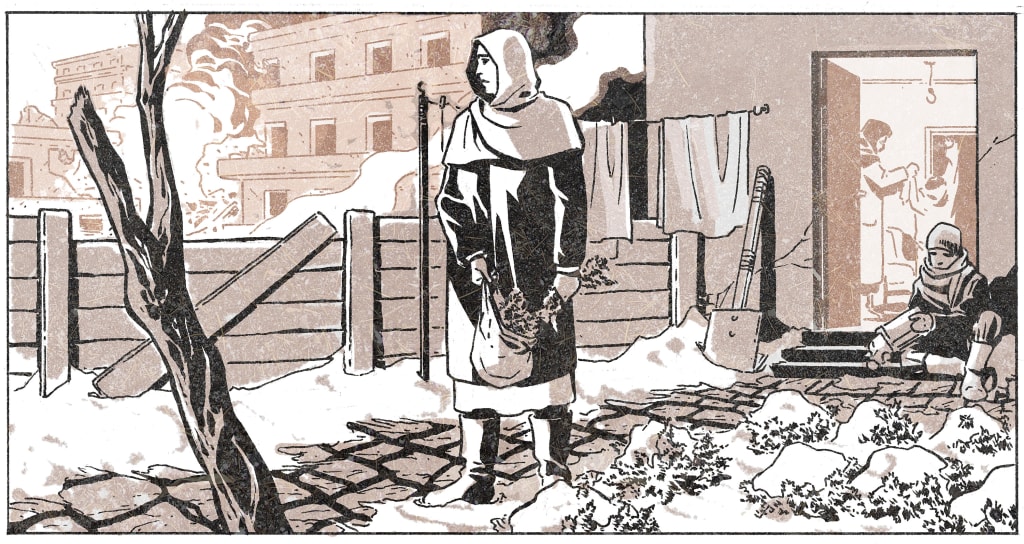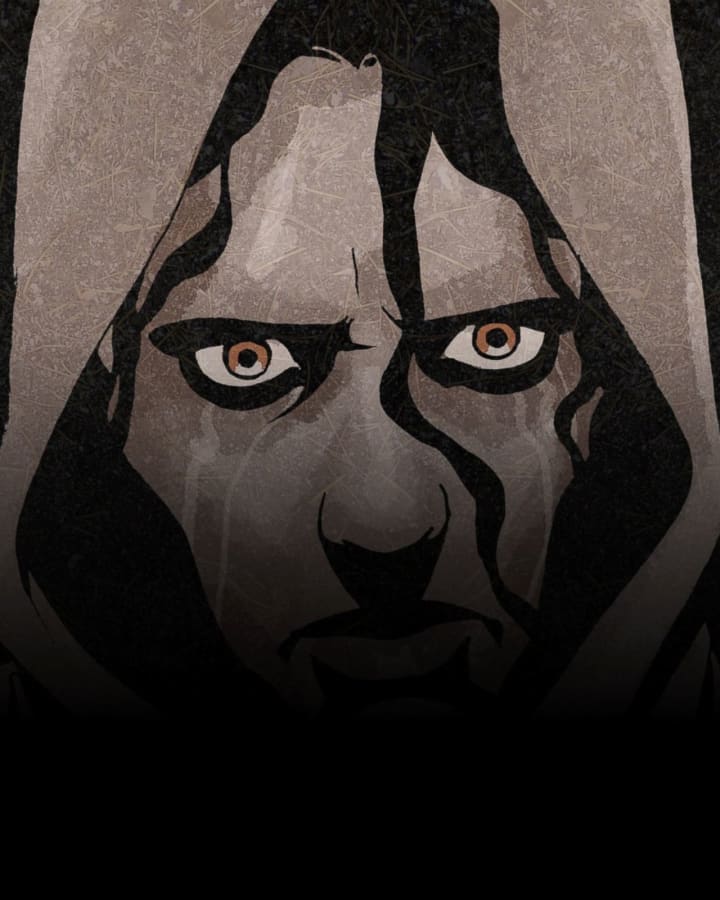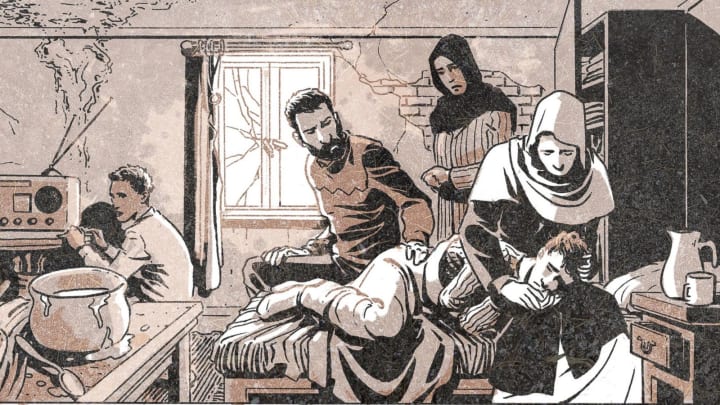Madaya Mom: How Marvel's Latest Comic Profiles A Real-Life Superhero
The compelling true story of a heroic mother fighting for her family's survival in Syria.

As starvation and death plunge the Syrian mountain town of Madaya into despair, a mother fights to keep her family alive. Since the town is under siege by the Assad regime, access to fuel, food, and electricity is extremely limited. Except for the occasional humanitarian aid truck, no one can enter; no one can leave. Even journalists have been unable to enter since the siege began; Assad’s regime is operating a complete media blackout. But that doesn’t mean that the story of Madaya can’t be told. During two weeks in January, ABC News communicated via text messages and phone calls to get first-hand descriptions of what conditions in Madaya are like from a woman nicknamed “Madaya Mom” and her family, and now ABC News journalists Xana O’Neil and Rym Montaz and Marvel Comics illustrator Dalibor Talajic have teamed up to tell the story of a family (who remains nameless for their own protection) struggling for survival in an online graphic documentary available to read here.

Of course it isn’t the first graphic novel to illustrate a real-life story of suffering and war - you may already be familiar with Art Spiegelman’s award-winning graphic novel Maus, which illustrated Spiegelman’s father’s experiences as a Polish Jew during the Holocaust, Emmanuel Guibert’s The Photographer: Into War-Torn Afghanistan with Doctors Without Borders, which told of the realities of life in Afghanistan in 1986, and Marjane Satrapi’s autobiographical work Persepolis, which told the story of a young Muslim girl growing up in Iran during and after the Islamic revolution. But Madaya Mom is happening now, as we read, which makes it all the more tragic, and she’s a very relatable heroine. In “An Inside Look at the Making of Madaya Mom” ABC journalist Rym Momtaz says that Madaya Mom is “a housewife who...gives a voice to her people...quite anxious about being a whistleblower in a city which is besieged. She’s a woman in her early 30s who has five children that she has to care for. Every day she has to worry about where her next meal is literally coming from.”
The story is, unsurprisingly, heartbreaking. In one full-panel illustration, Madaya Mom explains that she, her husband, and her five children attempt to fill their stomachs each morning and stave off hunger pangs by drinking mint or thyme tea from their small garden. In another, she recounts how her children became ill after eating humanitarian aid cans of food - their bodies had become so used to not eating that digestion made them sick. In Madaya, it’s become normal to see excruciatingly thin children fainting from hunger. None of this suffering has been artificially exaggerated; in January, the Guardian reported “Families are eating leaves, grasses and water flavoured with spices in the town of Madaya, where rice is sold by the gram because a kilogram costs as much as $250 (£170). Some have killed and eaten their pets.” The article goes on to report on how older children are sometimes pushed around in strollers because they are starving and too weak to walk. Many people, including children, have lost their limbs while trying to gather plants, even grass, to eat near minefields. They’ve burned their furniture just to keep warm against the harsh winter.

The comic’s devastating illustrations are created by Marvel artist Dalibor Talajic, who has loved drawing since childhood. In an ABC video titled “Meet the Artist,” he describes his creative process as something very freeing: “The world is yours to build. Everything is up to you.” He continues, “Comics can explain anything to anyone. They can have great importance in social matters.” Talajic’s work on Madaya Mom is different from anything he’s ever done before. As he says, “There’s no real script. There are only a few messages sent out from the city. Based on that, I had to illustrate...life.” From his own experiences as a teen in Yugoslavia in the 1990s, Talajic remembers feeling like his world had fallen apart. “The worst thing about that war is that you finally accept this new reality, just surviving on a daily basis.” But Talajic doesn’t consider his work a “war comic.” He told reporters, "I didn’t want to do a war comic; I wanted to make a comic with a civilian point of view, where you’re really powerless. You can’t do anything. You’re just waiting for it to pass or for you to die.”
The life that Talajic draws for us is one almost devoid of hope. In Madaya, many people feel that the world has forgotten them. One panel depicts residents of the town gathering to listen to a United Nations Security Council Briefing, shattered when the meeting ended with no action relating to Syria. “I truly feel depressed and that the world has abandoned us because we are weak,” says Madaya Mom. Each of the characters becomes real for the readers as we see what they’re thinking. Madaya Mom remembers how her family grew succulent apples and pears before the war - they were farmers; their lives were full. One of her sons has saved his money to buy a watch. In the graphic documentary (and in real life), he is still saving it, still hoping for a future in which such a luxury is possible.

In learning more about the important work that Madaya Mom is doing to raise awareness around the world, I was horrified to see the comments of those who actually would like to forget all about the suffering Syrian town. “Sorry, but I like my superheroes to be...uh, super,” one person commented. Another said, “Probably not my thing, but I guess if you’re into non-fiction stuff it would be good.” I’m as much a fan of Superman and Wonder Woman as the next person, and I feel like if there’s one thing I’ve learned from them, it’s the being a superhero has less to do with what superhuman abilities a person possesses and more to do with how they use what skills they do have for good. The Green Goblin has as much power as Spiderman, but he’s no hero. As Rym Momtaz says “Superheros are not defined by their power or their physique. Superheroes are in the heart.” Heroism is exactly what Madaya Mom and the others struggling to survive are defining by their daily existence. How else could you describe going without food for days in the midst of terror and isolation so your children can eat? What else do you call risking your life to share your people’s suffering with the world? That is the kind of heroism that I want to read about, that I believe is worthy of illustration and dispersion to every person with a conscience. In a statement at its release, Marvel editor-in-chief Axel Alonso called Madaya Mom “a story that needs to be seen and told.” I couldn’t agree more.
About the Creator
Sarah Quinn
I'm a writer in love with India, Stars Wars, fantasy, travel, and Thai curries. My childhood heroes were Luke Skywalker and Joan of Arc. I muse on superheroes, sci-fi, feminism, and more.






Comments
There are no comments for this story
Be the first to respond and start the conversation.